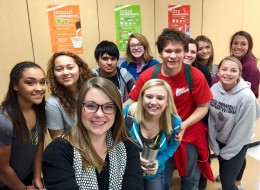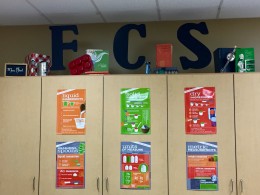
Kacie teaches a variety of Family and Consumer Science (FCS) classes. They include Independent Living, Career and Life Planning, Nutrition and Meal Planning, as well as Wellness and Nutrition for grades 9-12.
“My Independent Living and Career and Life Planning classes focus on career readiness, as well as many skills that will help successfully develop students into independently living adults in their post high school and college lives,” Kacie said. “Nutrition and Meal planning, as well as Wellness and Nutrition, focus on nutrition and how to prepare nutritionally balanced meals. My Wellness and Nutrition course is co-taught between myself and the P.E. teacher. In that class, students spend part of the week learning exercises that they can do independently, then come to my class for the second part of the week where they learn to make nutritionally balanced snacks.”
As a first-year teacher, Kacie is finding her content connects with her students.
“I think the thing that I enjoy most about teaching FCS is the age group that I am with and how FCS content is directly relates to their lives,” she said. “I enjoy preparing lessons that students are able to take away something helpful and relevant to their lives right then or in the near future. Recently, my students have been working on interview skills and resumes, and one of my students came to me and said that he was able to use his resume to get a job over Thanksgiving break! It’s just really exciting to see so many young adults take classes that will teach them to be more self-sufficient in their adult lives.”
She’s also surprised at the various opportunities she has had to grow as an educator.
“I felt really confident coming from my student teaching experience and have learned so many new things just within this first semester of teaching,” Kacie said. “Each day is completely different than the next, and with each new day, there is a new set of challenges to overcome. Those challenges are what keep me coming back each day ready to see what the day has in store for me.
“I’ve also been really surprised by the relationships that I’ve built with my students. I knew that I would really enjoy spending time with them in class, but there are some students who just drop by before or after school to talk or to ask advice about things going on in their lives.”

While she’s feeling some success, she knows there’s much more to learn.
“As a new teacher, I am always trying to get to know my content better,” she said. “The summer after graduation, I spent a lot of time going to conferences and workshops held by teachers who had been in the profession a lot longer. I am always trying to improve lessons by offering different strategies for each student to learn the material.”
For her fellow new teachers, she encourages them–and reminds herself–“to just take each day as it comes.
“Do your best and don’t compare yourself to other teachers,” she said. “Don’t stress out if you don’t have everything all figured out right at the beginning. Likely, you will change things as you go anyway! As a new teacher, I find myself comparing my classroom to other teachers who have been teaching for a lot longer than myself. Its really easy to start thinking that you’re not doing a good job when you’re new, but no two teachers teach the same way and something that may be working for them may not be a perfect fit for you.”

And she credits the KSU College of Education with helping her move into her new career.
“During my time in the College of Education, I found that the class ‘Middle Level Education’ truly prepared me for working with students in middle school. I had a blast working with the younger students during student teaching, and I felt that this class helped me make difficult material more relatable and understandable to them. I also felt like K-State’s College of Education prepared me for collaboration between different class contents. I have had many opportunities to work with other teachers in different departments in the past few months at Buhler High, and I felt that a great deal of that preparation came from working with students in various classes who were teaching a different subject than I was.”
As part of that collaboration, she said she and her department partner are working on a proposal to the school’s Board of Education to have college credit offered to students for taking their classes.
“We are hoping to offer more opportunities for college credit or more opportunities to earn certifications that will benefit students’ lives during and after their high school career.”